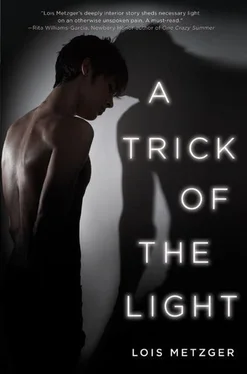Lois Metzger
A TRICK OF THE LIGHT
THE FIRST TIME I REACH MIKE WELLES, HE’S IN A tunnel. It’s hot, syrupy hot, July hot, the kind of heat where your breath going out feels the same as the air going in, or so I imagine. I’ve been trying to talk to Mike but he can’t hear me or can’t listen—the distinction isn’t important. How long has it been—weeks or months, days? Time is a syrupy thing, too, not always so easy to pin down.
Mike is walking with his best friend, Tamio Weissberg, in the long tunnel beneath the expressway. There’s pigeon crap pretty much everywhere, which has earned this place a nickname: the stinky tunnel. They just saw King Kong , the original 1933 version, at You Must Remember This, a neighborhood place that shows only the classics. This is far from the first time Mike and Tamio have seen King Kong , which they hail as the masterpiece of something called stop-motion animation. But it’s their first time seeing it in a movie theater and, needless to say, they were the only ones in the audience without gray hair.
They have to talk loudly because of the whooshing cars overhead, and their voices echo against the concrete walls.
Tamio: “That’s the best death scene in movies. Nobody dies like Kong.”
Mike: “Every time I keep hoping that he won’t die. It’s so stupid.”
I couldn’t agree more. It’s a movie. It will never change. But other things can change. I wish I could tell Mike that.
Mike: “The expression in his face is so amazing—how’d they do that? He’s just a little model of a gorilla, but he looks really, truly in love. Love at first sight, poor guy.”
Tamio: “On the big screen you really notice his fur moving around. You can practically see fingerprints on him.”
Mike: “Well. You can’t help that. When you handle the model—”
Tamio (shaking his head): “Hair spray. Then the fur won’t move as much.”
Mike is always impressed by Tamio’s knowledge of what seems like everything. This summer they’re working at a baseball camp for all of July and half of August, along with a kid named Ralph Gaffney. They’re counselors for the six- and seven-year-olds. It also impresses Mike how much the little kids love Tamio, how they beg to help him with the equipment. They’re actually disappointed when they can’t carry buckets of balls. And when they skin their knees, like a little kid name of Ezra did this afternoon, they don’t want to cry in front of Tamio.
Mike: “You know, when Ezra got hurt, Ralph couldn’t care less—he just got mad because it was taking too long to wash the blood off and put on a Band-Aid.”
Tamio: “Ralph’s an asshole. Poor Ezra. Did you tell him he shouldn’t have been trying to steal third?”
Mike: “Not only that, but he was sliding.”
Apparently they’re not supposed to slide until they know how to do it right.
Tamio: “Ezra’s a nice kid, but he thinks he’s in the majors. When I pitch to him, he tries to tell me how to throw a slider. Hey, watch out!” He pushes Mike away from a ton of pigeon crap.
Mike: “Thanks, you saved my life.” He laughs. But he doesn’t feel like it. I can tell. I know everything there is to know about Mike Welles.
Why Mike doesn’t feel like laughing:
Sometime in June, Mike’s mom, Regina Welles, known as Gina, a professional organizer, started sleeping whenever she wasn’t helping people clean out their closets, and at night began taking baths that last so long, the water must be cold by the time she finally climbs out. Around the same time, Mike’s dad, Douglas Welles, lawyer, started going to the gym. He spends so much time there that Mike hardly sees him.
I don’t know why this bothers Mike. He should relish the freedom all of it gives him. But he can’t resist his natural urge to talk to Tamio.
Mike: “Things have been kind of weird at home.”
Tamio: “Yeah? How so?”
Don’t.
Mike stops walking.
Tamio: “What’s the matter?”
Mike stares ahead blankly.
Tamio: “Are you all right?”
Mike is thinking about how he just heard a voice in his head. A whisper of a voice, but definitely a voice.
Tamio: “What do you mean, things are weird at home?”
Don’t talk about it.
Mike still can’t move, stuck in the stinky tunnel. He thinks, Am I crazy?
Tamio: “Hey, what’s going on?”
Mike: [nothing]
Tamio: “Dude. Say something.”
Mike: “It’s nothing.”
Mike knows something’s wrong but doesn’t know where to turn. He thinks things are bad and can only get worse. He has no idea what achievements are within his reach, what rewards await him, how much better his life is going to be.
Infinitely better.
MIKE LIVES WAY OUT IN BELLE HEIGHTS, IN A FAR corner of Queens that he dislikes and finds dull and frustrating. You take buses everywhere in Belle Heights; you spend a lot of time waiting for buses. Mike thinks there’s nothing to do here except wait for the bus. It’s a long subway ride away from Manhattan, and nobody from Manhattan goes to Belle Heights unless they’re driving through it to get to the airport.
But Mike should be perfectly happy with Belle Heights. So what if nothing happens? You make your own excitement; you create your own drama. You can live the life you are supposed to live without the distraction of a bustling city or the so-called charm of a country village or the smugness of the suburbs. Belle Heights has a pleasantly anonymous quality. Planes are constantly overhead, which creates a whooshing sound in the sky; the Belle Heights Expressway is always crowded, creating a whooshing sound on the ground. Some streets are as hilly as roller coasters because back in the Ice Age glaciers traveled south, pushing rocks and sand and clay in front of them, and the glaciers stopped here before moving up north again. They left all their glacier junk behind, right here in Belle Heights. Mike learned this in earth science last year and found it boring, of course. There’s so much beauty here—sights, smells, sounds—but he’s blind and deaf to it. He needs to open his eyes, get some poetry in his soul. It’s something for him to look forward to.
Mike was born in Belle Heights Hospital on March 9, fifteen years and four months ago, on an unseasonably warm day for spring, or so his mom tells him. He’s spent his whole life on Belle Heights Road, a curving street with two-story brick houses, each attached on one side to another two-story brick house, and each with a small patch of semi-neglected lawn. Despite the nearness of the neighbors, Mike only knows them to wave and say hi, if anything at all. Once a family moved in halfway down the block and Mike thought the people moving out were the new people coming in.
I think parents generally do their children more harm than good, and Mike’s parents are no exception. They don’t seem to care about him. They all go to a movie, and Mike’s dad says it’s hilarious while Mike’s mom finds it upsetting. They argue. Does either of them even ask Mike what he thinks?
Mike grew up with one grandparent, Grandma Celia, who died a year ago—or was it two years? Grandma Celia lived in one of those assisted-living facilities, but Mike’s dad always said:
“We do all the assisting! She calls here for everything, and when she does, it’s like a fire alarm! If she drops something behind a bureau and can’t reach it, we go and get it for her. If she needs something at the pharmacy, she hurt her ankle, so we go to the pharmacy for her.”
Читать дальше













